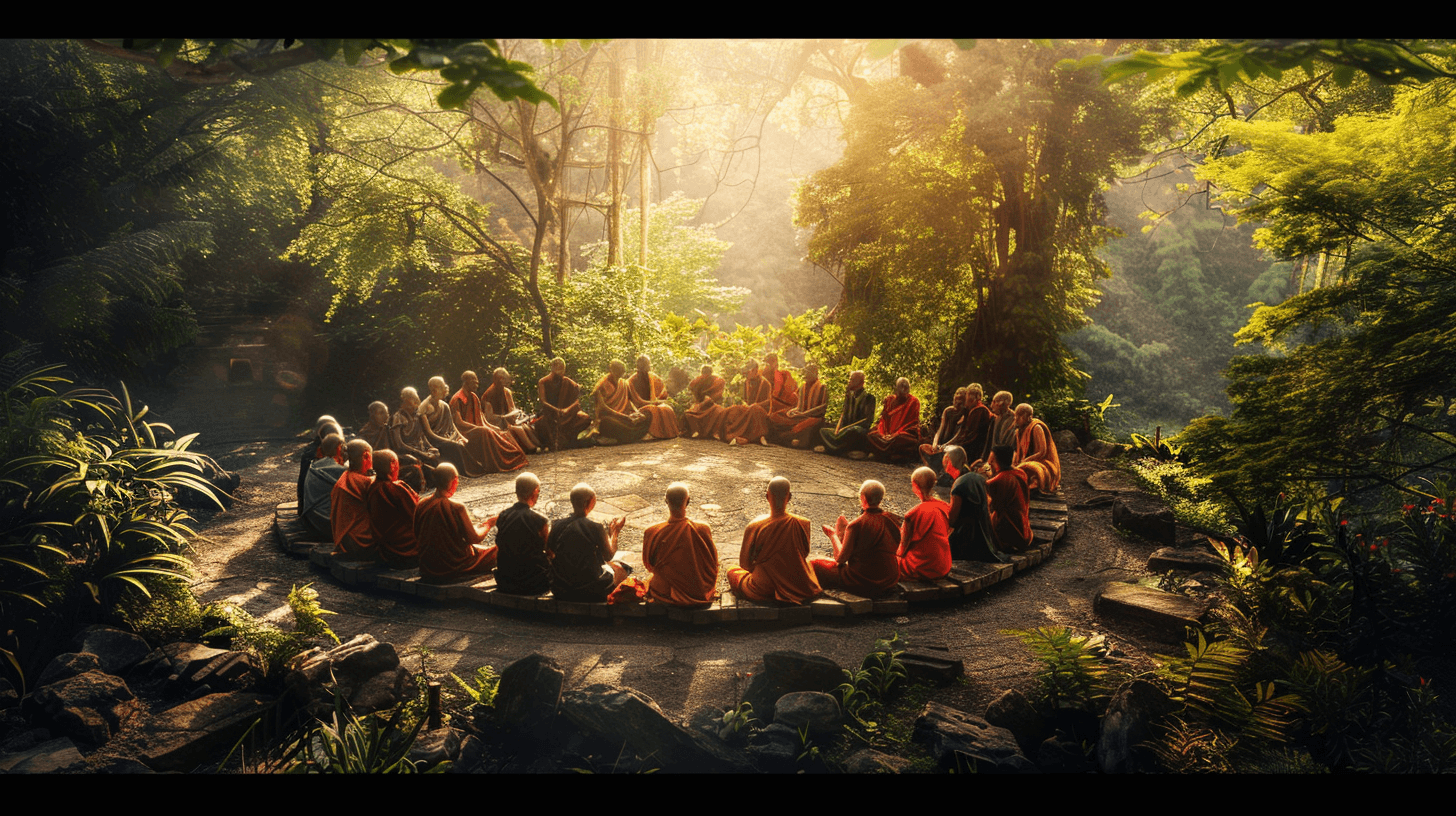Introduction

Have you ever wondered how to navigate life’s inevitable challenges with grace and understanding? Throughout history, countless individuals have turned to Buddhism, a tradition rich in profound insights into human suffering, to find solace and direction. This philosophy, centered around understanding and transforming suffering, offers timeless guidance that resonates with people across cultures and ages.
At the heart of Buddhist philosophy is the concept of suffering, known as ‘dukkha’ in Pali. Why is this concept so pivotal? Buddhism teaches that acknowledging suffering is the first step towards overcoming it, offering not just a passive acceptance but a proactive path to alleviation. This understanding fosters resilience and wisdom, allowing practitioners to turn life’s adversities into avenues of personal growth and spiritual awakening.
Consider the story of Tenzin, a young man whose life was fraught with hardships and loss. Tenzin’s journey took a transformative turn when he encountered the teachings of Thich Nhat Hanh, a renowned Buddhist monk. By embracing the practice of mindfulness and understanding the impermanence of life’s challenges, Tenzin learned to appreciate the present moment without being overwhelmed by the pains of the past or the uncertainties of the future. His story is a testament to how Buddhist teachings on suffering can dramatically alter one’s approach to life’s hardships.
As you delve deeper into this guide, “Exploring Buddhist Teachings on Suffering: A Guide to Books and Wisdom,” you are invited to uncover the transformative power of these teachings. This exploration is not just an academic exercise but a personal journey that offers practical guidance through renowned texts and the lived experiences of practitioners like Tenzin. Join us in uncovering the profound wisdom embedded in ‘Buddhist teachings on suffering,’ ‘Buddhist philosophy,’ and ‘coping with suffering,’ and see how these insights can illuminate your path through the complexities of life.
The Concept of Suffering in Buddhism

As you continue on this enlightening journey, let us delve deeper into the core of Buddhist philosophy: the Four Noble Truths, with a particular focus on the first truth—Dukkha, or suffering. What does Buddhism teach us about the nature of suffering? Buddhism categorizes suffering into three distinct types: the suffering of suffering, the suffering of change, and all-pervasive suffering. Each category sheds light on the intrinsic aspects of our existence that challenge us, change us, and ultimately, offer us the path to liberation.
The Suffering of Suffering refers to the most apparent forms of pain we encounter—illness, injury, birth, and death. These experiences are direct and harsh, reminding us of our vulnerabilities. The Buddha’s teachings in the Dhammapada state, “Birth is suffering, aging is suffering, sickness is suffering, dissociation from the loved is suffering, not to get what one wants is suffering.”
The Suffering of Change involves the subtle but constant changes that cause us distress—a happiness that fades, relationships that evolve or end, and pleasures that dissipate leading to dissatisfaction. Thich Nhat Hanh eloquently speaks to this, noting, “The happiness that we feel is impermanent; the suffering is also impermanent. This realization can lead us to the path of cessation.”
All-Pervasive Suffering is the most profound, rooted in the very conditions of our existence. This form of suffering arises from our attachments to permanence in an impermanent world and our ignorance of our true nature. The Dalai Lama addresses this by teaching, “To understand Buddhism is to understand impermanence, which binds us to continual suffering.”
These teachings on suffering are not merely philosophical concepts; they are reflections of the human condition, offering profound insights that have stood the test of time. By understanding the nature of suffering, we begin to unravel the complexities of our existence and find pathways to greater peace and understanding.
This exploration invites you, the reader, to not only grasp the theory but to engage with the profound depth of Buddhist wisdom on suffering. As we reflect on these teachings, consider how they resonate with your own experiences. This section aims not only to inform but to touch a deeper emotional chord, encouraging a reflective journey into the universal nature of this human condition.
Top Books on Buddhist Teachings About Suffering

Go on board on a literary journey through the profound world of Buddhist teachings on suffering. This section guides you through a meticulously curated list of authoritative books, each offering a unique perspective on the Buddhist understanding of suffering. These essential reads are categorized into beginner, intermediate, and advanced levels, ensuring that whether you are just starting your exploration or seeking deeper insights, there is a guide for you.
Beginner Level
“The Heart of the Buddha’s Teaching” by Thich Nhat Hanh
Summary: Thich Nhat Hanh introduces the core teachings of Buddhism and explains the Four Noble Truths in a manner accessible to all. This book emphasizes the practical application of these teachings in everyday life.
Key Takeaways: Learn to recognize and embrace suffering as a path to peace and liberation.
Impact: Readers have found this book to be a gentle yet profound introduction to understanding the nature of suffering and the path to its cessation. One testimonial notes, “This book opened my eyes to the beauty of Buddhism in managing my daily stresses.”
Intermediate Level
“When Things Fall Apart: Heart Advice for Difficult Times” by Pema Chödrön
Summary: Pema Chödrön discusses how to deal with the chaos of modern life and the suffering it causes. The book is based on Buddhist teachings but is tailored for a contemporary audience.
Key Takeaways: Embrace challenges and learn how to transform pain into compassionate growth.
Impact: Many readers express how Chödrön’s insights provided them with the tools to face life’s inevitable difficulties with grace. “Chödrön’s words helped me navigate through my divorce with more peace and understanding,” shares a reader.
Advanced Level
“The Tibetan Book of Living and Dying” by Sogyal Rinpoche
Summary: This book offers a comprehensive introduction to the teachings on death from a Tibetan Buddhist perspective, encouraging a profound understanding of life and suffering.
Key Takeaways: Gain insights into the deeper teachings of impermanence and the process of dying as a transformation.
Impact: Testimonials often reflect on how this book has changed perspectives on death and suffering, with one reader noting, “It transformed my fear of death into an understanding of life’s true meaning.”
This exploration of Buddhist books on suffering is not just an academic exercise but a personal journey into the heart of human experience. By engaging with these texts, you are invited to reflect on your own experiences of suffering and to seek further wisdom. Each book has been chosen not only for its scholarly merit but for its ability to touch the heart and stir the soul, offering paths to understanding and alleviating suffering as taught by Buddhism. Let this be your invitation to a deeper, more profound understanding of life’s challenges and the Buddhist path to overcoming them.
How These Teachings Help Address Personal and Universal Suffering

Dive into the practical applications of Buddhist teachings on suffering and discover how these ancient principles extend beyond personal enlightenment to address broader societal issues. This section explores the transformative power of mindfulness and meditation techniques, which are not only tools for achieving personal serenity but also catalysts for broader social change.
The Transformative Power of Mindfulness and Meditation
Mindfulness and meditation are cornerstone practices in Buddhism, primarily aimed at cultivating a deep awareness of the present moment and a detachment from the habitual patterns of thought that exacerbate suffering. These practices do more than just reduce personal stress; they lead to greater mental clarity, emotional stability, and an enhanced capacity for empathy. For example, consider the story of Maria, a healthcare professional who turned to mindfulness meditation to manage her burnout and anxiety stemming from her demanding job. Through consistent practice, not only did her own mental health improve, but she also developed greater compassion and patience in dealing with her patients, thereby improving the care she provided.
Case Studies of Personal Transformation
The real-life impact of these teachings can be seen in diverse settings around the world. Take, for instance, Dr. David Kearney’s work from the VA Puget Sound Health Care System. He led a significant study comparing the effects of loving kindness meditation to cognitive processing therapy in treating PTSD among veterans. This study demonstrated that loving kindness meditation, which incorporates Buddhist principles of compassion and mindfulness, was as effective as the more traditional cognitive processing therapy in reducing PTSD symptoms. This approach allowed veterans to cultivate self-compassion and manage negative emotions, such as guilt and self-blame, often associated with PTSD (VA Research).
Empathy and Compassion in Action
The development of empathy and compassion is another significant outcome of engaging with Buddhist teachings. These qualities extend beyond personal benefits, influencing community and societal interactions. Sarah, a school teacher, incorporated mindfulness exercises into her classroom, which not only helped her students deal with academic stress but also fostered a more inclusive and understanding school culture. Her efforts showed a decrease in bullying and an increase in student cooperation and empathy, demonstrating the societal benefits of individual mindfulness practices.
The Dual Benefit: Personal Peace and Social Harmony
The dual benefit of Buddhist teachings on suffering—achieving personal peace and contributing to social harmony—is a compelling aspect of these ancient wisdoms. By integrating these insights into daily life, individuals can foster significant changes not only within themselves but also within their wider communities. This ripple effect of personal transformation leading to social change underscores the powerful potential of Buddhist principles when applied to contemporary issues like mental health, community development, and even global conflicts.
This section of the article aims not only to educate but also to inspire you, the reader, to consider how you too can apply these age-old wisdoms to modern-day challenges. By embracing Buddhist teachings, you can contribute to a more compassionate and understanding world, proving that personal healing and societal transformation are interconnected and achievable.
Incorporating Buddhist Wisdom into Everyday Life

Transition from theory to practice by exploring how to seamlessly weave Buddhist insights into your daily life. This section of the journey invites you to reflect on how the profound teachings of Buddhism can be applied in simple, everyday actions to foster mindfulness, resilience, and compassion.
Daily Practices for Mindfulness and Compassion
One of the most straightforward ways to incorporate Buddhist teachings into your daily routine is through meditation. Starting your day with just five minutes of seated meditation focused on gratitude can profoundly influence your perspective throughout the day. This practice helps center your mind, allowing you to approach daily challenges with calmness and gratitude.
Another valuable practice is to end your day by journaling about moments where you felt a connection to Buddhist teachings on impermanence and suffering. This reflection not only deepens your understanding of these concepts but also enhances your ability to cope with life’s inevitable changes and challenges.
Guided Meditations and Resources
To further cultivate a calm mind and an open heart, guided meditations can be incredibly beneficial. These sessions, led by experienced practitioners, can help you explore deeper states of mindfulness and compassion. Reliable online resources and apps such as Insight Timer, Headspace, or the Plum Village app offer a wide range of guided meditations suitable for both beginners and advanced practitioners.
The Role of Community in Spiritual Practices
Engaging with a community, or Sangha, is crucial in sustaining and deepening your practice. A Sangha provides support, shared experiences, and collective wisdom, enhancing your spiritual journey. Whether locally or online, connecting with a community can offer you the encouragement and motivation needed to maintain your practices. Engaging in group meditations, discussions, and retreats can amplify your learning and help you integrate Buddhist teachings more fully into your life.
Downloadable Resources
To help you begin or deepen your practice, here are some downloadable resources that you can access:
Meditation Guides: Find step-by-step meditation guides that offer structured approaches to mindfulness and meditation.
Mindfulness Exercises: These exercises can help you cultivate awareness and presence in your daily activities, available on platforms like Mindfulness Exercises Website.
Community Forums: Connect with others on your spiritual path through forums and discussion groups available in digital Sanghas like Online Sangha Community.
Your journey towards integrating Buddhist wisdom into your daily life is not just about personal growth but also about contributing to the well-being of your wider community. Each step you take in practicing mindfulness and compassion can ripple out, influencing others around you in positive ways. This section aims not only to inform you but to empower and inspire you to make each action a step towards personal and spiritual growth. Embrace these practices, and watch as they transform not just your life, but also the lives of those around you.
Mastering Life's Challenges: Buddhist Wisdom for Navigating Painful Situations"
The Role of Community in Understanding and Overcoming Suffering

In the practice of Buddhism, the Sangha, or community, plays a pivotal role not just as a support network but as a profound contributor to understanding and alleviating suffering. Sangha traditionally refers to the monastic community of monks and nuns who lead lives dedicated to the practice of Buddhist teachings. However, in a broader sense, it encompasses all individuals who are on the path toward enlightenment, offering a supportive network that transcends the boundaries of traditional monastic life.
Understanding Sangha
Sangha extends beyond physical gatherings; it includes any collective of individuals who share a commitment to Buddhist practices and principles. This community provides emotional support, deepens understanding through shared experiences, and enhances personal growth by mirroring aspects of our inner lives in each other’s journeys.
Real-Life Benefits of Community Engagement
The benefits of engaging with a Sangha are both profound and impactful. For instance, consider the story of Emma, a software developer who struggled with anxiety and stress. By joining a local meditation group, she found a supportive environment that helped her apply mindfulness techniques, significantly reducing her daily stress levels. Similarly, Michael, a retired veteran, found solace in a Buddhist community online where he shared his experiences and learned from others how to cope with PTSD through guided meditations and Buddhist teachings on suffering.
How Communities Operate
Sanghas operate through various mechanisms that foster collective and individual healing:
Shared Meditation Sessions: Regular meditation with a group enhances consistency in practice and deepens the meditative experience through collective energy.
Study Groups: These allow members to delve deeper into Buddhist texts and teachings, enhancing their understanding and application of these principles in everyday life.
Communal Retreats: These retreats offer immersive experiences where deeper healing and understanding can be fostered away from the distractions of everyday life.
Connecting with a Sangha
To connect with a Sangha, you can start by looking for local meditation centers or temples that offer group sessions. Many communities also maintain an online presence through forums and social media, providing a platform for engagement regardless of geographical constraints. Websites like Meetup.com or local spiritual centers can also be valuable resources for finding a community. Participating in community-led events not only enriches your practice but also integrates you into a network of like-minded individuals.
Conclusion

As we conclude our exploration of Buddhist teachings on suffering, let’s reflect on the profound journey we’ve embarked upon. Throughout this guide, we’ve delved into the foundational concepts such as the Four Noble Truths, which serve as the cornerstone of understanding suffering from a Buddhist perspective. We’ve explored a range of enlightening literature that provides deep insights into the nature of suffering and the path to its alleviation. Practical applications in daily life, from mindfulness exercises to meditation techniques, have been discussed to show how these ancient teachings can be integrated into our modern lives. Additionally, we’ve highlighted the supportive role of the Sangha—our community—that enriches this spiritual journey and enhances our collective resilience.
The transformative power of these teachings in addressing both personal and universal suffering cannot be overstated. They offer a pathway not only to personal peace but also to fostering a more compassionate and understanding world. As you reflect on this information, consider how your understanding of suffering might change your perspective or actions towards yourself and others.
Now, I invite you to take a step further. Delve deeper into the books listed, practice the meditation techniques introduced, and engage actively with your local or online Buddhist community. The value of ongoing learning and community involvement is immense, providing you not only with support but also with continuous growth opportunities.
Let this not be the end but the beginning of a deeper exploration into Buddhist teachings. By understanding and applying these principles, you can profoundly impact your life and those around you. How will you integrate these insights into your daily experiences to reduce suffering and enhance well-being?
Let the journey continue, enriching your life and that of others, as you embrace the timeless wisdom of Buddhism. Continue to explore, learn, and practice, for in these teachings lies the key to transforming suffering into a source of profound growth and peace.







